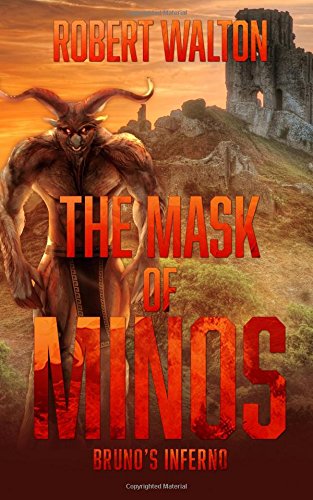The Mask of Minos: Bruno’s Inferno by Robert Walton
What would make a retired, independently wealthy archaeologist want to leave the comforts of his retreat in Costa Rica, join forces with an accountant from the Bureau of Audits and Reclamation, and fly to Europe in search of a mysterious notion with no foundation in reality, all while being chased by nefarious killers from a secret society older than Herodotus? Well, for starters, the accountant is coercive and, oh yes—she’s a knock-out.
Harry Thursday has been in trouble before in Robert Walton’s first novel, Fatal Snow. Now THE MASK OF MINOS takes the reader through an allegoric story retelling Theseus’ journey to becoming the ruler of Greece. Along that path, he is besotted by enemies and finally battles the son of Zeus, ruler of Crete, father of the Minotaur—half-man, half-bull. With the aid of his patron god Poseidon, Theseus brings down the once mighty kingdom in a fiery earthquake, freeing all from its oppressive dominance. And so Harry Thursday battles the secret society known to only a few as the Hyperboreans in his attempt to find—and keep them from finding—the powerful mythical mask.
Give us some insight into THE MASK OF MINOS. What does your main character, Harry Thursday, do that is so special?
THE MASK OF MINOS is the story, really, of an ordinary man cast into extraordinary situations. He’s a man no more courageous and heroic than you or me. But one of the things that is so fun about writing novels is one’s ability to put such people to all sorts of trials, run them through a plague of hardships and see how their moral strength airs through it all.
But in THE MASK, Harry carries out his destiny quite well—he mans-up, if you will—and saves the day; he even gets to kill a few people—all in the name of justice, of course, despite the fact that his general attitude is sometimes inappropriately casual for the affairs in which he’s involved.
What inspired you to write this sequel to Fatal Snow?
I wanted to take Harry on a more fantastic journey than the first time. In Fatal, he really is thrown into situations that he would normally avoid. Wouldn’t we all rather watch someone else stand up to a murderous fiend on television than actually do it? It’s why we read.
So I read a story about Theseus and thought it might be nice to write a sort of allegorical rendering of that in modern times, loosely mind you, all the while drawing a correlation between the two stories. I find this is a general theme in my work. I used the word “fantastic,” and by that I mean he encounters the mythical mask worn by the Minotaur centuries ago, and it’s supposed to hold a power more fearsome than imaginable, but does it really? This story examines that possibility.
What draws you to the thriller genre?
I think it is a genre that lends itself to a lot of things we want from books. First of all, a thriller and action novel is something easy and quick to read. We’re not talking literature here, we only want to entertain, and what better way to measure that than by keeping the reader involved, turning the pages, saying to oneself, “I’ll go to bed after this next chapter.” I want people to miss a dinner or a TV show when they’re reading my novels. Sit on the beach and get a suntan.
You’ve said before that you want to question the meaning of life in your writing. Do you think THE MASK OF MINOS accomplishes this?
Well, I just got done saying THE MASK OF MINOS is not a mind-bending read. I guess I kind of threw that one under the bus. But I try and put truth into any book I write; otherwise it wouldn’t be real, and no one would read it.
All things are relative, luckily for everyone. There is a story about a very wealthy man who was near death, and he asked the Lord if he could bring his wealth with him. An angel told him, “You can’t bring it with you; there is no place in heaven for money.”
The man pleaded and still the angel said no. But he insisted and the angel said he would talk with God and see about his request.
The angel reappeared to the man and told him that, by the grace of God, he was allowed to bring only one suitcase with him.
So he packed one suitcase full of gold bars and kept it by his bed. Soon after he died and stood at the pearly gates, St. Peter said, “You can’t bring that in here.”
“But,” the man said, “God gave me permission.”
“Okay,” said St. Peter, and he opened the suitcase and looked inside and exclaimed, “You brought pavement?”
What I mean to say is that my writing will always explore life in all its meanings. I am writing a science fiction novel, The Gods Among Us, about a girl who is taken back in time by aliens to become the first mother of the modern human species. The story asks the characters, “What are you doing here, and why?” More importantly, “Are the aliens living creatures or gods?” It’s an age-old dilemma.
*****
 Robert Walton, grew up in the small village of Narberth in the Main Line region of Philadelphia Pennsylvania. Armed with a degree in Archaeology from Penn State University, Bob has worked tirelessly over the years to live up to his father’s expectations. Having failed at that, he has traveled the world in search of the true meaning of life. Still, this has not stopped him from pursuing a career in writing that began in 2007 when he joined Pennwriters and The International Thriller Writers.
Robert Walton, grew up in the small village of Narberth in the Main Line region of Philadelphia Pennsylvania. Armed with a degree in Archaeology from Penn State University, Bob has worked tirelessly over the years to live up to his father’s expectations. Having failed at that, he has traveled the world in search of the true meaning of life. Still, this has not stopped him from pursuing a career in writing that began in 2007 when he joined Pennwriters and The International Thriller Writers.
To learn more about Robert, please visit his website.
- The Mask of Minos: Bruno’s Inferno by Robert Walton - May 31, 2016

